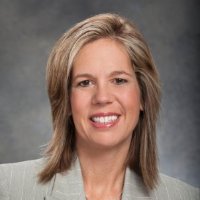Deanna Wise, CIO of San Francisco-based Dignity Health, didn't always want to be in technology, but found her career path with the help of some guiding mentors along the way.
Here, Ms. Wise shares some of her journey to landing the CIO position, including the nuances of being a woman in a traditionally male-dominated environment.
Editor's note: Answers have been lightly edited for length and clarity.
Question: Can you talk about your early education and whether you were always interested in the STEM fields?
 Deanna Wise: I was very fortunate and had a guidance counselor [in college] who made a great recommendation. In school, I enjoyed the sciences, and early on I had a data processing class. I did very well in it. And I was thinking about how I came from a rural community where my mother did not work, and in that instance I was thinking, "Oh, I'll go and maybe be an assistant or something like that." This counselor asked me, "Well have you had any computer programming classes?" And I said I had a data processing class and that I did great in it. And he said, "We're going to sign you up for that [computer science]."
Deanna Wise: I was very fortunate and had a guidance counselor [in college] who made a great recommendation. In school, I enjoyed the sciences, and early on I had a data processing class. I did very well in it. And I was thinking about how I came from a rural community where my mother did not work, and in that instance I was thinking, "Oh, I'll go and maybe be an assistant or something like that." This counselor asked me, "Well have you had any computer programming classes?" And I said I had a data processing class and that I did great in it. And he said, "We're going to sign you up for that [computer science]."
It was about having the willingness to have a door open for you and not be afraid of saying, "Sure, I'll try that."
Q: What shaped your interest in technology and pursuing a career in this industry?
DW: Several of my professors at college were female and very strong individuals. They did recruiting for some companies that would hire from the college. I was recruited to work for a life insurance company, and I did life insurance for five years. As I did that, I realized that I didn't have as much customer interactions as I might like. I was at the desk coding and missing the social aspect to it. A friend of mine, actually my husband, was going to school getting his degree with a CIO of a hospital, and he came to me and said, "They're looking for people on the healthcare side. It seems like it would be a great fit for what you're looking for." And it was.
Again, it's a strange coincidence of someone looking out for me and listening to what I had interests in and my willingness to have the courage to do something different.
Q: You've been CIO of four systems in the past 12 years, and for eight years before that you were director of applications. Did you face gender-based discrimination or bias along your career path?
DW: I have to say no. It never dawned on me that I'm a woman in a man's field. I did look around at tech conferences and meetings and say, "Wow, there are very few females." But Dignity Health is 75 percent female and 25 percent male [in terms of staff across the entire organization]. In my interactions in dealing with people, I never felt it was a barrier.
Q: How have you seen women in tech fields changing over the course of your career?
DW: I don't know if it's about changing, but I think females have the ability to leverage some innate skills they have. For instance, I think females have strong skills to influence and strong skills to provide customer service and to take care of people in general. We as caregivers, we learn this at early stages, if you take care of the family you can drive things forward. Using those skills are things that bring success to females in healthcare.
Q: The HIMSS survey on gender-based compensation indicates the gender wage gap persists, as does access to upper managerial roles. Can you comment on why you think this persists and what the industry needs to do to change it?
DW: I was shocked by those [statistics]. I'm shocked and don't understand how they exist. I say that because within my own structure in Dignity Health, and this is my third place that has done this, we build career ladders and job families, and we build salary bands [or salary ranges] within those. They're based on facts of your years of experience and skills you bring to the table. For example, if you're a programmer that also has a pharmacy background, that's an addition to [your skills].
Q: What are some lessons you've learned along the way to shatter the glass ceiling?
DW: It's about having confidence, marketing yourself, recognizing you are a female and you can balance your family and your career. Many times people may not go for that next promotion because a female may be fearful of taking on those extra work and duties and asking, "How am I going to balance it?" The truth is there are ways to balance and do both.
Q: Any last comments or thoughts?
DW: I love what I do, and it's a great time to be in healthcare. The technology and the information that we're bringing at the point of care, we're making a difference.
More articles on CIOs:
CIO salaries growing quicker than the average worker's
Putting Epic's EHR to work: Hawaii Pacific executives on the intersection of health IT & quality
11 C-suite quotes on Epic: Interoperability, price & more

